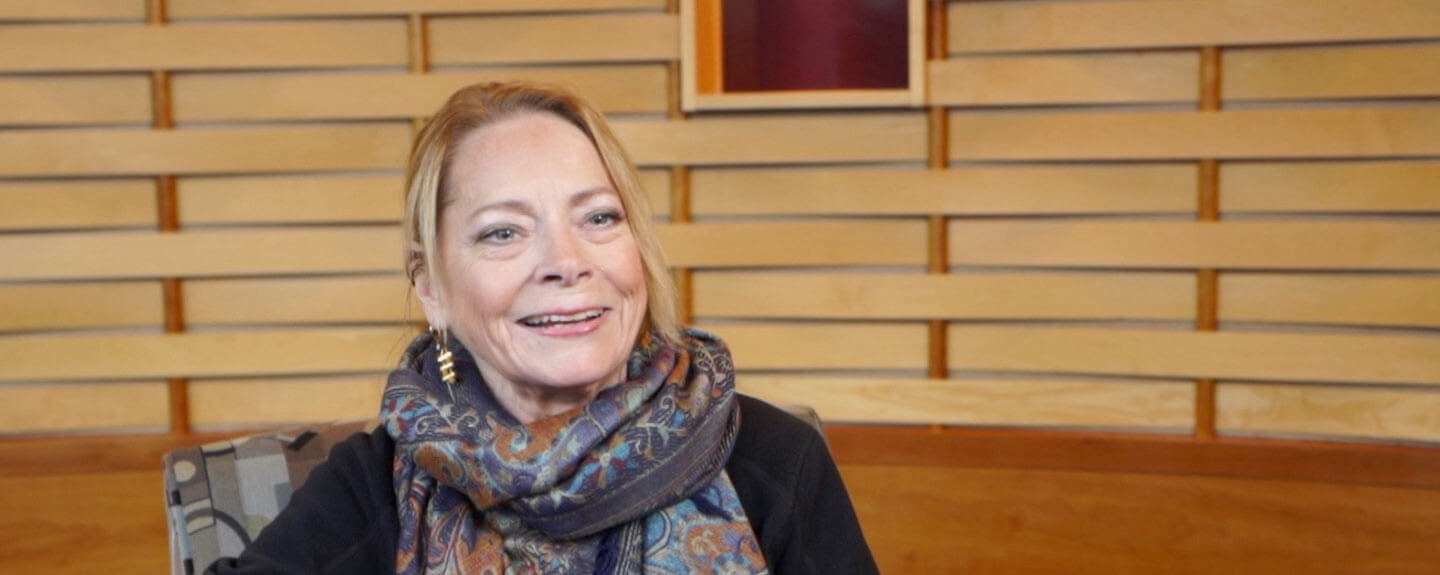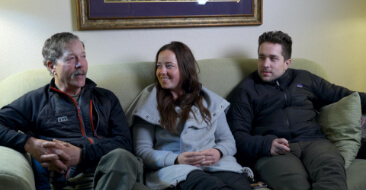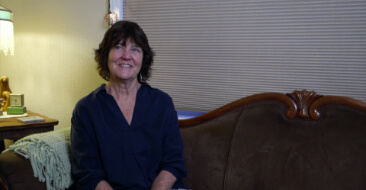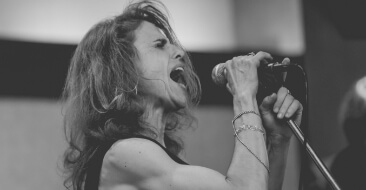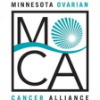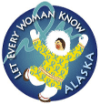One Saturday morning, just days after being told she might have ovarian cancer and scheduling surgery with her doctors, Ellie Burnett went skiing in the 2013 Alaska Ski for Women.
“There’s an immediacy to being outside and skiing,” she says. “You don’t have time to think about things, just what’s right in front of you and going on that second.” Her choice within the first 24 hours of a possible cancer diagnosis is a good example of Ellie’s upbeat and positive attitude toward most things in life, even cancer.
“Cancer shouldn’t define you,” she says. “It shouldn’t be, ‘Oh, there’s Ellie, she has cancer.’ It should be, ‘Oh, there’s Ellie, isn’t she a good dresser?’ Or, ‘A good skier?’ Or, ‘She’s funny,’ you know? Because a lot of people have cancer. There’s a lot of good and positive out there in the world of cancer. It’s not all doom and gloom—I hardly even see that. I’ve traveled a lot and gone to different cities. I’ve learned to say yes to a lot of things—even this interview—there probably was a time when I would say, ‘I don’t want to do that.’ I’ve lived my life now for seven years with cancer. If I sat at home fretting about it—well, I’ve done a lot of amazing things in those seven years and met incredible people! Don’t give into cancer. Don’t make that your primary focus in life.”
Ellie grew up all over the world. Her father worked in forestry and engineering in Iran when she was small, and when she was 12 years old, he worked for the United Nations on a forestry project in Turkey. “It was pretty wonderful,” she says. “I got to see a lot of that part of Europe and Greece. My mother was an armchair historian. We went to see a lot of ruins and explored Iran. I come from a large family of five brothers and sisters. When we lived in Turkey, my oldest sister and brother stayed in Alaska and the four of us pre-teens bounced around Turkey. We had a lot of freedom and it was really pretty wonderful.”
Ellie moved back to Alaska in 1963, and went to high school at what was then Service-Hanshew in the growing city of Anchorage. After graduation, she studied art and dance at Anchorage Community College and the University of Alaska Anchorage while she worked as a graphic artist. She grew up Nordic skiing, and in 1989, she moved to Utah and started a ski shop where she stayed for 10 years. When Ellie met her husband Brian, he was an alpine ski racer. “I discovered ski lifts and I never went back,” she laughs. Ellie never received a degree, but she spent her time working, skiing, and dancing.
“I’ve had a pretty wonderful life,” she says, “I’ve gotten to experience things that a lot of people haven’t, I’m very lucky in that respect. There was a time when I was working for a master gardener in the summertime. I was paid to water flowers and to dig around in fabulous gardens, and then in the wintertime I skied, worked in a ski shop, and I was a buyer for ski fashion. I would think to myself, ‘Some people work their whole lives to do this in retirement, and I’m getting paid to do it! I’m pretty lucky that I’ve gotten to live the life that I have.’”
Don’t be fooled. Ellie’s positive outlook isn’t the result of a perfect life, but her inner strength in the face of both good and bad circumstances.
In 2012, however, she started feeling unwell. She was having a lot of stomach issues. Her primary care provider dismissed her symptoms as menopause, as she was 55 years old. “It was easy to do,” Ellie says. “I was the right age. I thought it might be that too. But I was very fit and active. I just had a feeling that something wasn’t right, and nobody could really put their finger on it. At the time, it was always kind of just, ‘women’s issues.’ You complain and you have aches and pains but a lot of women kind of do and we don’t really understand what’s happening with our bodies. Maybe we understand more now. At the time… There were just symptoms that I knew about because I got them from talking to my women friends, night sweats, and so on.”
Pain is what ultimately drove Ellie back to the doctor. Once again, she was told it was nothing: “Probably just the flu.” She went back home, but a few months later, her pain got more severe. She went to the community health center in Girdwood, where she lived, and she saw a nurse practitioner.
“She was more aware,” Ellie says, “She felt around and said, ‘I think you need to get a CAT scan right now,’ that afternoon. I could tell from her demeanor that it was quite serious. Later she told me she thought she felt a mass in my abdomen and she thought it was colon cancer.”
The day prior, Ellie had been cross-country skiing with her younger sister. They were skiing a new 5km trail that had been designed for an Olympic caliber event. Ellie’s younger sister is a Nordic skiing coach. As they went around the trail, Ellie complained a little, but her sister encouraged her like a good coach would. It was a very hard trail, but they made it the whole way. Ellie was signed up for the Alaska Ski for Women that Saturday.
On Thursday night, however, Ellie ended up back at the community health center. “Nobody would tell me what was happening until the doctor came into the exam room,” she says, “My husband was with me. He came and crawled into the little bed at the community health center with me and waited for the doctor to come back and tell us what to do next. We were like, ‘What is it?’ He was not very tactful. ‘Well, you have ovarian cancer and it has metastasized and completely spread in your abdomen.’ We were in complete shock—we didn’t know what to do.”
“When you hear those words, you think, ‘This is a death sentence,’” Ellie says, “Especially at that time with ovarian cancer.” There was no-one at the hospital who could see her that night, so the doctor recommended she go to Alaska Women’s Cancer Care the following day. In the meantime, he gave her a couple of Percocet and told her to go home. So that’s what she did.
“It was a pretty difficult night to say the least,” Ellie says. “We lived in Girdwood, and the road was closed due to an accident, so we couldn’t go directly home. We went to one of our favorite restaurants. I didn’t eat anything. I took my two Percocet, drank a glass of wine, then went into the bathroom and threw up. I came back and we sat around and went, ‘Wow, what next?’ We didn’t know what to think.”
The next day, Ellie and her husband went to Alaska Women’s Cancer Care and saw Dr. Thomas Burke. It was a Friday night and the lead doctor, Dr. Joanie Hope, was performing with her band, N.E.D. (No Evidence of Disease). “Dr. Burke was very comforting,” Ellie says. “He explained what they would do, the surgeries, and he told me, ‘Don’t worry. Nothing is going to happen immediately. We’re going to do surgery in 10 days.’ He showed me some pictures. I told him I didn’t want to look at any more, it was frightening. I went home and Saturday morning I skied the Alaska Ski for Women.”
Ellie didn’t share the diagnosis with her family right away. She waited until she had seen the doctor and she was sure. “One of my sisters had sent me an email, ‘I haven’t heard from you in a while, is everything okay?’ I just wrote a letter and replied to her email—copying everybody—my entire group of close women friends who I skied with. ‘No, everything is not okay. I have been diagnosed with ovarian cancer.’ I looked at my computer when I wrote the letter. The last thing I had done was research abdominal pain. I was trying to figure out whether or not I should go to the doctor.”
Ellie’s friends reached out to her. They made sure she stayed busy in the 10 days leading up to the surgery.
“The surgery was pretty major,” she says, “I went into the surgery not understanding all that it was going to entail. When I came out, I was in the ICU. When I really woke up, some of my friends were there, and my husband, and a very close friend who was a nurse. They were talking like they thought I was going to die, ‘We thought we lost you,’ they said. It was not as easy as they had hoped. They removed material from my pubic area all the way up into my diaphragm. They removed my spleen, parts of my liver, all my female organs, and a great deal of my small intestine. That’s all I can remember off the top of my head. The recovery took a while because it was a major surgery. I was in the hospital 21 days after surgery I think.”
Ellie had stage III ovarian cancer. At the time of her diagnosis, and to this day, ovarian cancer does not have any screening tests that would aid in the early detection of the disease. For this reason, by the time a woman like Ellie starts to express the symptoms of her ovarian cancer, it is already in stage III or stage IV. Genetics can help clue-in medical professionals to what is going on in a woman’s body. In fact, as many as 20% of ovarian cancer cases are genetic, which is why awareness projects like Any Mountain are encouraging people to learn about their family cancer histories.
“It never occurred to me that it was cancer,” Ellie says. “My family had no history of it. My mother had a bout of uterine cancer when she was 88 years old but I think us girls just thought, she’s had six children and she’s 88. My mom said, the only other time she had been in the hospital was to have children. Cancer wasn’t something we really thought about. I worried more about skin cancer when I was leaving Alaska and going to Hawaii to be in the sun.”
As it happened, Dr. Hope was also Ellie’s mother’s physician, and the one who gave her the hysterectomy.
When Ellie got home from the hospital, she spent a lot of time alone. “We don’t have any children and my husband works, so I was used to it and it wasn’t terrible, but at times I felt like it was very lonely. Cancer is a lonely journey. No one else gets it. I had a friend who had gone through a form of leukemia and another friend who had what they think now was ovarian cancer. It wasn’t the people that you would think—strangers that come and talk to you about cancer. It may be because I was in Girdwood, it may be because I wasn’t receptive to it.”
Gradually, she started going out for walks. By late spring, she had even gone skiing a couple times.
“I physically was not able to do anything like that, I didn’t have any choice in the matter, but as soon as I could I did,” says Ellie. “It really helped me recover from the first major surgery and subsequent surgeries, just getting out and doing something right away and not dwelling on what just happened. With skiing, you don’t have time to think about anything else, you have to concentrate on what’s right then.
“I love being in the mountains. That’s my run-away go-to place. They make me feel powerful. I just find the mountains to be a beautiful freeing environment and every day is different. It’s not a dependable environment, and it’s challenging.”
After seven years of battling ovarian cancer and maintaining a positive and upbeat attitude through it all, Ellie’s advice for others can be summarized in four succinct statements: don’t go on the internet, listen do your body, get out into nature, and enjoy your life.
“First of all, take Dr. Burke’s advice and don’t look at the internet,” Ellie says, “I didn’t. It will just confuse you. I’ve learned now, it sends you down a rabbit hole to who knows what. Don’t try to self-diagnose anything, that just leads to anxiety. It’s been almost seven years since I was diagnosed and I’ve had a lot of little things pop up. If you checked everything out, you would have so much garbage in your brain. It’s not necessary. Go see a doctor, that’s what they’re there for. If you don’t like what they have to say, go see a different doctor. Don’t rely on yourself unless you have medical experience.”
“Second, understand this. I live where there are mosquitoes, I can feel them land on me, but I could not feel the cancer engulfing my entire abdomen. I don’t understand that. Know that there are things you may not be aware of that may require some piece of medical equipment that a doctor or a medical clinic can use to give you the answer instead of trying to self-diagnose. I don’t think enough women are aware of ovarian cancer and like any cancer, if it’s caught early the outcome is much better. Listen to your body. If you feel like something is wrong and your doctor tells you, ‘No, everything is fine,’ and you still feel like something is wrong, go find another doctor. Go find somebody who will listen to you.”
Ellie says the doctor’s office is busier and busier every time she goes. Ovarian cancer is the fifth highest cause of cancer deaths among women, deadlier than any other female reproductive cancer. Awareness projects like Any Mountain are bringing media attention to this fact.
“I don’t have a formal religion,” Ellie says, “But I would say I’m fairly spiritual. I run away to the mountains or the woods and I just feel the nature around me—the everlasting beauty of nature and the fact that human existence is pretty short, really. I appreciate that. I don’t ever feel sad. I’m 62—it’s not like I have my whole life ahead of me. I feel painful about cancer when I see little kids, young women, and young families going through it. That hurts me. It’s not fair.
“A lot of the time, I feel like I owe somebody and I should be giving back in some way for all the good, positive things I have experienced and the people and the caregivers in this building. I don’t quite know how to give back. It’s a regret of mine. How do you repay except to say, ‘Thank you?’”
Ellie is proof that you don’t have to quit living your life when you get a cancer diagnosis.
“The only difference in my life might be…that I might do things I might not have done before,” Ellie says, “‘You want to go bungee jumping?’ I might say yes, whereas in the past I might have said, ‘No, are you crazy?’ I have a tendency to say yes instead of, ‘I’ll have to think about it.’”
